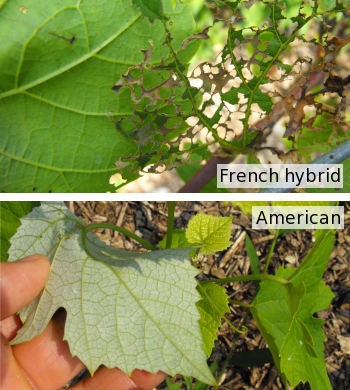
Insect-resistant vegetable varieties
 Japanese beetles taught me my first lesson about
variety selection. We had a terrible problem with these invasive
beetles on our grapevines until I realized that French hybrid varieties
are much more tasty to Japanese beetles than are American
varieties. The latter can be distinguished by their thicker
leaves, which are often whitened underneath, and by the relative paucity
of beetles chowing down on the leaves.
Japanese beetles taught me my first lesson about
variety selection. We had a terrible problem with these invasive
beetles on our grapevines until I realized that French hybrid varieties
are much more tasty to Japanese beetles than are American
varieties. The latter can be distinguished by their thicker
leaves, which are often whitened underneath, and by the relative paucity
of beetles chowing down on the leaves.
In addition to grapes,
Japanese beetles also defoliated our young sweet-cherry tree, but damage
on other plants seemed to stay at low enough levels that the trees
could shrug it off. After switching our small vineyard over to
American grapes and removing our cherry tree, the Japanese beetle
pressure was reduced to the point where hand-picking was sufficient to
keep beetles at bay.
In general, variety selection can be a helpful
strategy in controlling at least five of the dirty-dozen worst garden
pests in the U.S. The table below includes pest-resistant
varieties drawn from several different extension-service websites and
other sources.
| Pest insect |
Insect-resistant varieties |
| Cabbageworms |
Collards, Brussels
sprouts, broccoli, and cabbage are tastier to these insects than are
other crucifers. Within each type of vegetable, vegetables with
dark green, glossy leaves are more resistant to cabbageworms, while
cabbage butterflies sometimes avoid laying eggs on red cabbage
varieties. Resistant cabbage varieties include Chieftan Savoy,
Early Globe, Mommoth, Red Acre, Red Rock, Round Dutch, and Savoy
Perfection Drumhead. |
| Corn earworms |
Any corn with a tight husk will
be more resistant to earworms. Specifically resistant varieties
include Country Gentlemen, Golden Security, Seneca, Silvergent, and Staygold. |
| Cucumber beetles |
In general, cucumber beetles
prefer zucchini-type squash over others and don't like burpless
cucumbers as well as other varieties. Blue Hubbard squash, Ashley,
Chipper, Gemini, Piccadilly, Poinsett, and Stono cucumbers; Early
Prolific, Scallop, Straightneck, and White Bush squash; and
Galia, Passport, Pulsar, Rising Star, and Super Star melons are all
reported to be resistant to cucumber beetles. However, the more important issue is to select a variety resistant to the bacterial wilt carried by cucumber beetles. These wilt-resistant varieties include Connecticut Yellow Field, Harvest Moon, and Howden pumpkins; Waltham butternut; Buttercup squash; Black Beauty zucchini; and Ashley, Chinese Long, Chipper, County Fair, Eversweet, Gemini, Improved Long Green, Saticoy Hybrid, Sunnybrook, and Tokio Long cucumbers. Watermelons are usually resistant to bacterial wilt. |
| Squash bugs |
Squash bugs prefer yellow summer
squash over zucchinis, squash over pumpkins, pumpkins over gourds, and
gourds over melons. Resistant varieties include acorn squash,
butternuts, Early Summer Crookneck, Green Striped Cushaw, Improved Green
Hubbard, Spaghetti, Sweet Cheese, and zucchinis (except for the
susceptible Cocozelle). |
| Squash vine borers |
Varieties resistant to squash
vine borers tend to have thin, tough stems. In addition, vining
types are more resistant than bush types since the former can root along
their nodes and survive moderate levels of borer damage. The most
resistant varieties include butternuts and Green Striped Cushaw,
followed by Dickenson Pumpkin and Summer Crookneck. Other
varieties reputed to have at least some resistance include acorn squash,
Cucuzzi (also known as snake gourd), and Connecticut Field, Dickenson,
and Small Summer pumpkins. |
I hope you enjoyed this excerpt from Naturally Bug-Free!
If so, you can download the ebook for free on Amazon by clicking the link above today. Or drop me an email to receive a pdf copy instead. Thanks for reading, and don't forget to leave a review when you're done!
| This post is part of our Naturally Bug-Free lunchtime series.
Read all of the entries: |
Want more in-depth information? Browse through our books.
Or explore more posts by date or by subject.
About us: Anna Hess and Mark Hamilton spent over a decade living self-sufficiently in the mountains of Virginia before moving north to start over from scratch in the foothills of Ohio. They've experimented with permaculture, no-till gardening, trailersteading, home-based microbusinesses and much more, writing about their adventures in both blogs and books.
Want to be notified when new comments are posted on this page? Click on the RSS button after you add a comment to subscribe to the comment feed, or simply check the box beside "email replies to me" while writing your comment.
- Remove comment
- Remove comment
